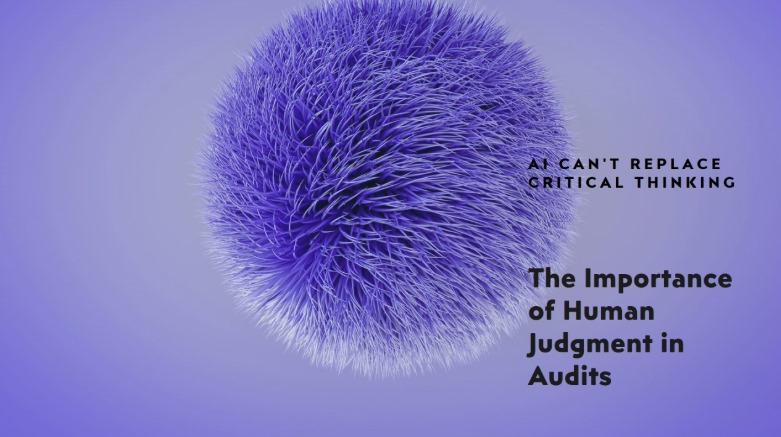
The Importance of Human Judgment in Audits
1. Introduction to AI-augmented audits
Welcome to the future of auditing, where artificial intelligence (AI) is revolutionizing the way we examine financial records and uncover insights. Imagine audits powered by algorithms that can process vast amounts of data at lightning speed, flagging anomalies and trends with unmatched efficiency. While AI offers incredible benefits, it’s essential to remember that there are aspects of auditing that still require the unique touch of human intelligence and judgment. Let’s explore how these two forces can complement each other in the audit process for optimal results.
2. Efficiency and insights provided by AI in audits
AI in audits has revolutionized the way data is processed and analyzed. By automating repetitive tasks, AI streamlines audit procedures, saving time and resources for businesses. The efficiency of AI algorithms allows for quicker identification of anomalies or discrepancies in financial records. This rapid analysis enables auditors to focus their attention on investigating potential issues more thoroughly.
Moreover, AI offers valuable insights by uncovering patterns and trends that may not be readily apparent to human auditors. Through advanced data analytics, AI can detect irregularities across large datasets with precision and speed. These insights help auditors make informed decisions based on comprehensive information, enhancing the overall quality of audits conducted.
Incorporating AI into audits significantly increases productivity and accuracy, making the auditing process more effective and reliable than ever before.
3. Limitations of AI in audits
While AI has revolutionized the audit process, it does come with its limitations. One of the key challenges is the lack of contextual understanding that humans naturally possess. AI may struggle to interpret complex situations or understand subtle nuances that a human auditor could easily grasp. Additionally, AI relies heavily on historical data and patterns, which might not always be sufficient when dealing with unique or unprecedented scenarios.
Another limitation is the inability of AI to exercise judgment based on ethical considerations or professional skepticism. Human auditors bring years of experience and a moral compass that guides their decision-making in grey areas where rules alone may not suffice. Furthermore, there are limitations in how well AI can adapt to changing regulations or unexpected developments in real-time.
Despite these constraints, integrating human expertise alongside AI capabilities can address these limitations effectively by combining machine efficiency with human intuition and judgment. Working collaboratively allows for a comprehensive approach that leverages the strengths of both technology and critical thinking skills.
4. The value of human critical thinking and judgment in audits
In the world of audits, human critical thinking and judgment play a vital role that cannot be replaced by AI. While technology can crunch numbers at lightning speed and identify patterns, it lacks the nuanced understanding and intuition that humans bring to the table.
Humans have the ability to interpret complex data in context, consider various factors beyond what is presented on paper, and make informed decisions based on experience and expertise. This level of insight is invaluable when dealing with intricate audit issues that require thoughtful analysis and reasoning.
Furthermore, human auditors can adapt to unexpected situations, exercise professional skepticism when necessary, and ask probing questions that may uncover potential risks or inconsistencies within financial records. These qualities add a layer of depth to audits that goes beyond what AI alone can achieve.
While AI-enhanced audits offer efficiency and insights, they still depend on human oversight to ensure accuracy, integrity, and ethical considerations are upheld throughout the entire process.
5. How AI and humans can work together in the audit process
In the world of audits, AI and humans have found a way to collaborate seamlessly. Artificial intelligence excels at processing vast amounts of data quickly and accurately, identifying patterns and anomalies that might go unnoticed by human auditors.
On the other hand, human auditors bring critical thinking skills, intuition, and nuanced judgment to the table. They can interpret complex findings, understand context, assess risks, and make decisions based on ethical considerations.
By harnessing the strengths of both AI and human auditors, organizations can benefit from a comprehensive audit approach that combines efficiency with thoughtful analysis. Human oversight ensures that audit results are interpreted correctly while AI streamlines processes for increased productivity.
Together, AI and humans create a powerful synergy that enhances the quality and effectiveness of audits in today’s fast-paced business environment.
6. Ethical considerations when using AI in audits
When it comes to using AI in audits, ethical considerations loom large. One major concern is the potential for bias in algorithms, which can skew results and lead to inaccurate conclusions. Transparency is crucial – understanding how AI makes decisions is essential for maintaining trust in the audit process.
Another ethical issue revolves around data privacy and security. Auditors must ensure that sensitive information remains protected when utilizing AI tools. Additionally, there’s a question of accountability – who bears responsibility if an error occurs due to reliance on AI?
Maintaining professional skepticism is vital even with advanced technology at our disposal. Human oversight helps catch nuances that machines might overlook, ensuring a more thorough examination of financial records. Balancing the benefits of AI with ethical principles is key to upholding integrity in audits.
Conclusion: The importance of balancing technology and human expertise in audits
As the audit landscape continues to evolve, it is evident that while AI-augmented audits offer significant efficiency and insights, they are not a complete substitute for human critical thinking and judgment. The synergy between technology and human expertise is crucial in ensuring comprehensive and reliable audit outcomes.
By leveraging the capabilities of AI for repetitive tasks, data analysis, and pattern recognition, auditors can focus on higher-order strategic thinking, risk assessment, and decision-making. This collaboration allows for a more holistic approach to auditing that combines the strengths of both machines and humans.
However, it is essential to recognize the limitations of AI in audits and acknowledge that ethical considerations must be at the forefront when implementing these technologies. Trusting solely in algorithms without human oversight can lead to oversights or errors that may have significant implications.
Finding the right balance between technology-driven automation and human insight is key to maximizing audit effectiveness. Embracing AI as a tool rather than a replacement empowers auditors to enhance their analytical skills while upholding integrity, professional skepticism, and ethical standards in financial reporting processes. It is through this harmonious integration of technology and human expertise that audits can truly deliver value-added insights for stakeholders.






